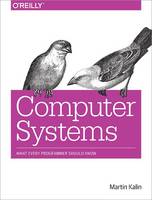


|
|
|
books
| book details |
Computer Systems: What Every Programmer Should Know
By (author) Martin Kalin

|
This book is currently unavailable. Enquire to check if we can source a used copy
|
| book description |
Computer Systems covers topics you need to know to become a better programmer. Author Martin Kalin draws on knowledge he gained writing large industrial applications, web and non-web alike: for those applications, it's always the systems issues that come to the fore - running short on or out of memory, application crashes and restarts, running too slowly, contending with problems on the host machine, and so on. The emphasis in the book, from start to finish, is on how an understanding of the underlying computer system is essential to writing correct, robust, and efficient code - regardless of the language or the run-time context (e.g., JavaScript executing in a browser context, an Objective C app running on an iPad, a Rails web site hosted on Heroku, etc.). It answers questions such as: When my program runs, what resources does it need? (CPUs, memory, I/O devices, etc.) How does my program get these resources? (Calls to operating system routines, implicitly or explicitly made.) How does the way in which I write code--the way I structure my program--impact the efficiency of resource use?
| product details |
Normally shipped |
Publisher | O'Reilly Media, Inc, USA
Published date | 31 May 2015
Language |
Format | Paperback
Pages | 300
Dimensions | 250 x 150 x 15mm (L x W x H)
Weight | 666g
ISBN | 978-1-4919-0620-0
Readership Age |
BISAC | computers / computer science
| other options |
|
|
|
To view the items in your trolley please sign in.
| sign in |
|
|
|
| specials |
|
Let's stare the future down and, instead of fearing AI, become solutionists.
|
|
This first comprehensive biography of Cecil Rhodes in a generation illuminates Rhodes’s vision for the expansion of imperialism in southern Africa, connecting politics and industry to internal development, and examines how this fueled a lasting, white-dominated colonial society.
|
|
|
|
|